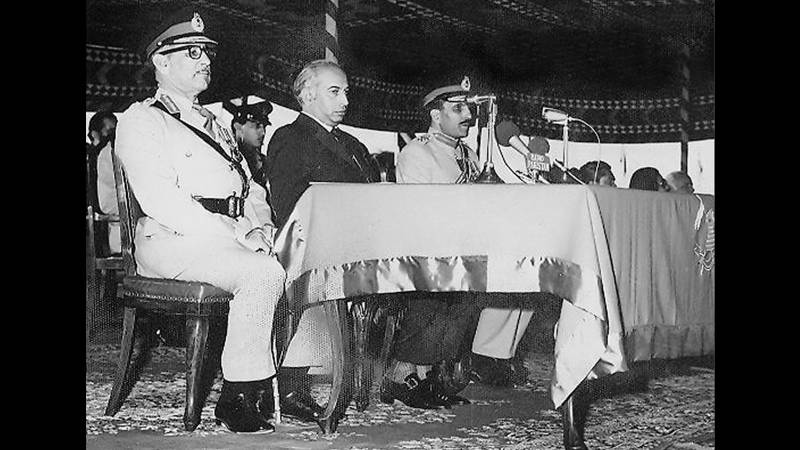
In 1974, I was serving on the staff of the HQ of the armoured division in Kharian when an interesting but controversial ceremony took place in the Cantonment. It was the investiture ceremony of PM Zulfikar Ali Bhutto as colonel-in-chief of the Pakistan Armoured Corps. At Independence, the Pakistan Army inherited the tradition of appointing colonel commandants of battalions/regiments and the corps from its predecessor. It was an honorary title with no executive powers, but formed a link between the past and present. In 1952, the Armoured Corps appointed Lt Gen Muhammad Yusuf as its first colonel commandant and the practice continued. However, in 1974 the corps chose to appoint PM Zulfikar Ali Bhutto as its colonel-in-chief, which was a ceremonial appointment that originated within 18th-century European armies. It was usually reserved for a member of the royal family, and in Pakistan, it found its equivalent in the head of the government, who at that time was ZAB.
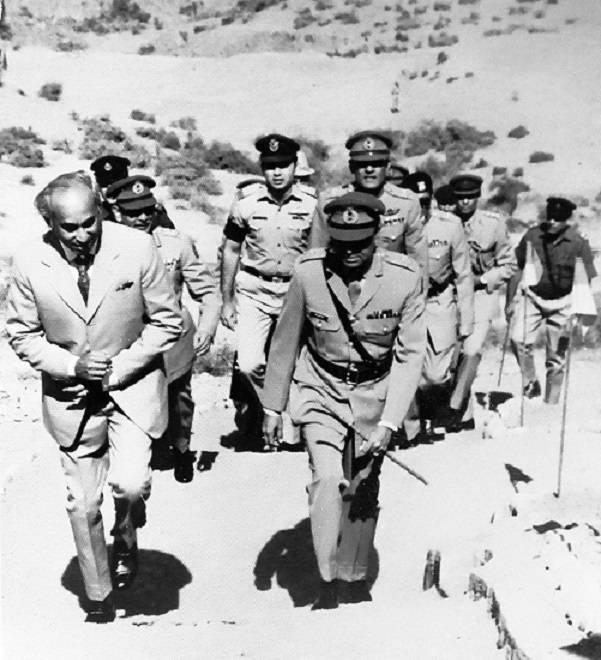
The idea originated from a request made by the 11th Cavalry at the Armoured Corps Commanding Officers Conference in Nowshera, which was presided over by Maj Gen Zia-ul-Haq. He was the GOC 1st Armoured Division, who in May 1974 had been appointed colonel commandant of the corps. 11th Cavalry was celebrating its 125th anniversary and wanted approval for inviting the PM to be their colonel commandant. Instead, Gen Zia proposed, and all those present in the meeting agreed, to invite him to be the colonel-in-chief of the Armoured Corps. The only other serving general of the corps was Maj Gen Syed Wajahat Hussain, the GOC of the armoured division in Kharian. He was a very proper and upright officer and had reservations about appointing a civilian, and that too the leader of a political party, as colonel-in-chief. However, he went along, probably because Zia had already asked Gen Tikka Khan, the army chief, and brought Brig Imtiaz, the Military Secretary of the PM, into the loop.
Bhutto was riding the crest of popularity both domestically and internationally. He had successfully orchestrated the repatriation of POWs without making any major concessions to India or Bangladesh. His hosting of the Second Islamic Summit at Lahore had elevated his standing as a leader in the Muslim ummah, resulting in state invitations from several countries including Bangladesh. However, the army still had reservations about him. They held him partly responsible for the breakup of Pakistan, and the trial of army officers in the infamous Attock Conspiracy Case had strained relations with the junior officers. Late Ardeshir Cowasjee the well-known columnist and social activist wrote that the ZAB never said or did anything without a reason. The PM would have considered this occasion a good opportunity to bridge the gap with the army's officer corps and show that he was now popular in the Army, with the event widely covered in the press and on PTV.
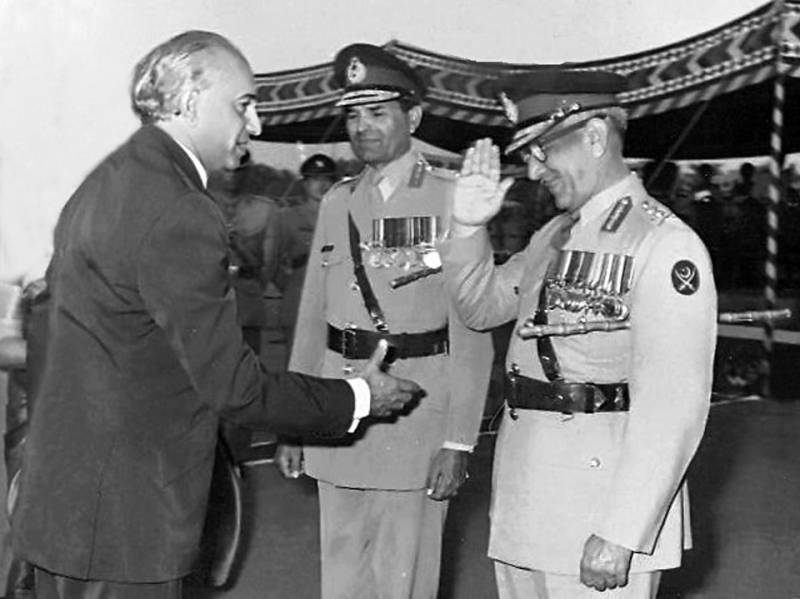
Once the PM agreed, Gen Tikka discussed the program with the two division commanders. The discussion centred on the venue with two main options: the Armoured Corps Centre in Nowshera and the 1st Armoured Division in Multan, given Zia's role as the Colonel of the Corps and the primary advocate for the proposal. However, ZAB wanted to visit a modern cantonment isolated from civilians and the obvious choice was Kharian. It had been constructed in the late 1950s by the US Army Corps of Engineers and at a distance from any large population centre.
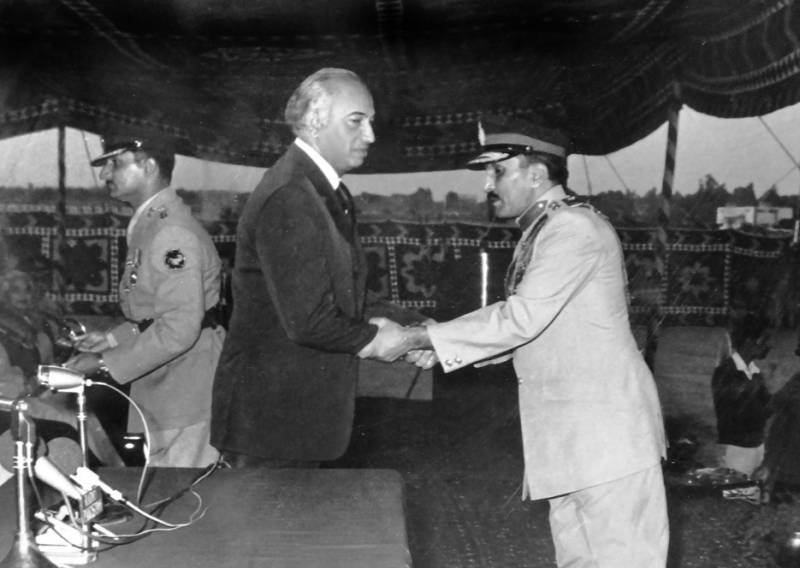
The investiture was held on 1 November 1974, when the weather in Kharian was perfect for the events which were all held outdoors. The invitees arrived a day earlier, and included senior commanders of the corps, the commanding officers of the armoured regiments, and senior retired officers. In addition, 11th Cavalry had their guests because they were concurrently celebrating their 125th Anniversary.
Gen Wajahat writes that the newly tailored uniform was laid out to wear by his orderly in Bhutto’s bedroom. However, at the last minute, the PM seems to have had second thoughts about it
There was a small faux pas a day before the event. The division HQ had neither been informed of Gen Zia’s time of arrival from Multan nor how he was arriving. A day before the event, the general officer alighted from a passenger bus on the GT Road and walked to the Kharian Military Police (MP) check-post. From here he had the MP call the division HQ to send a vehicle to pick up the general. While the staff was frantically arranging a car, the general hopped onto the scooter of an SDO of the Military Engineer Service (MES), who was passing by, and got dropped at the division HQ.
ZAB was coming for only a day and a night, and early in the morning of 1 November, he flew by helicopter to the Tilla Firing Ranges near Jhelum to see a demonstration of an armoured regiment group in an attack. He was accompanied by Gen Tikka and received by Lt Gen Azmat Baksh Awan, Commander 1 Corps, and Maj Gen Wajahat. After the demonstration, he lowered himself into the cramped cupola of the commander in a T-59 Tank, wore the crew helmet with its earphones and microphone, and ordered the gunner to fire. It is likely the thunderous blast of the 100 mm gun left him with a sense of exhilaration.
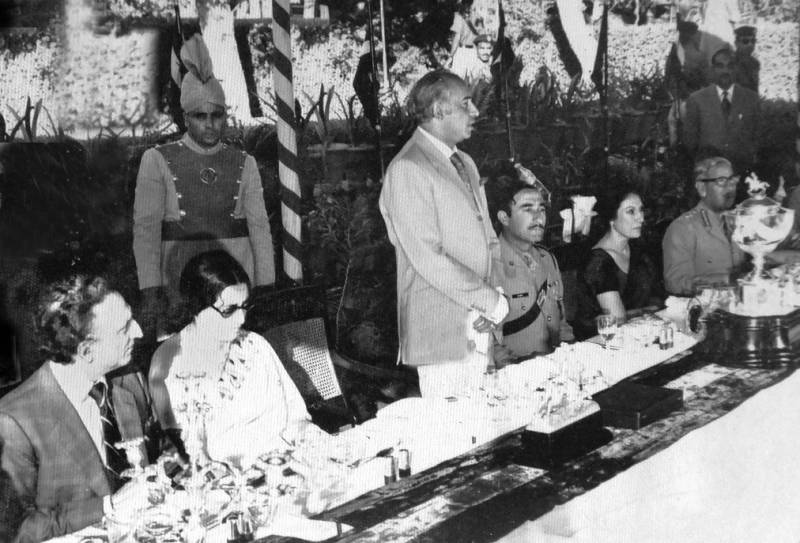
From Tilla, it was a short hop by helicopter to Kharian, where he and Mrs Bhutto freshened up at Flag Staff House, which had been vacated for them by Wajahat. They then proceeded to the Darbar in a horse-drawn carriage of the President's Bodyguard, where he was received by Maj Gen Zia, the Colonel Commandant of the Armoured Corps – who Bhutto knew well. A year earlier, Zia had presided over a Field General Court Martial at Attock Fort, to try officers implicated in a conspiracy to overthrow Bhutto's government.
During the ceremony, Zia delivered an address expressing gratitude to the Prime Minister for accepting the appointment. If a serving or retired officer had been nominated, the badge of rank of a full colonel would have been ceremonially pinned on their uniform. However, in this instance, ZAB was presented with a memento and an officer's cane, both engraved in silver, as tokens of his appointment. He was invited for lunch by 11th Cavalry, where Sahabzada Yaqub, who had been appointed by Bhutto as Pakistan’s ambassador to the USA, was also at the head table. Yaqub had commanded the regiment in 1953 before being detailed on a course at the prestigious École Supérieure de Guerre in Paris.
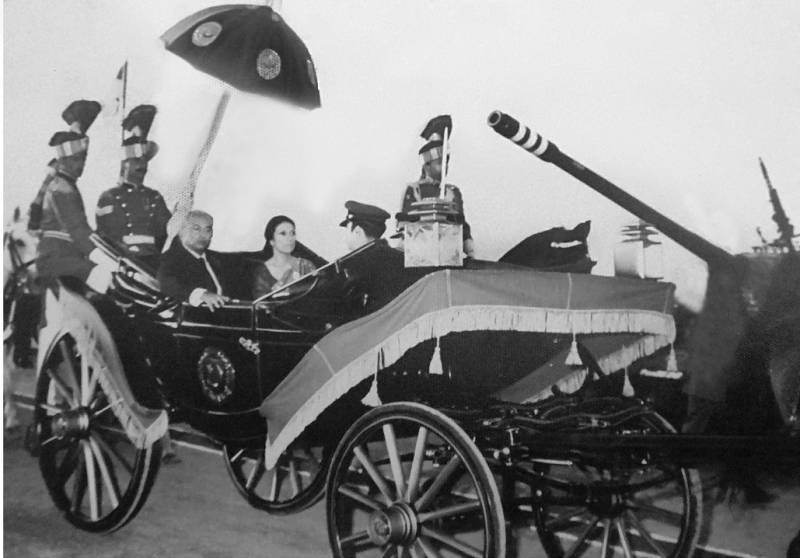
In the evening, there was a dinner for the PM and Mrs Bhutto hosted by the Armoured Corps. He was expected to attend in the new uniform of the colonel-in-chief that he had been persuaded to wear by Brig Imtiaz, the PM’s Military Secretary, on the behest of Zia. In his autobiography, Gen Wajahat writes that it was laid out to wear by his orderly in Bhutto’s bedroom. However, at the last minute, the PM had second thoughts and according to an unverified post on WhatsApp, he asked the opinion of his favourite and trusted ADC, Flt Lt Khalid Saeed Haroon. Khalid advised him not to, and when ZAB asked him why he thought so, the ADC replied, “In certain quarters, you are accused of being a dictator. If you are seen in uniform, you will come under greater criticism.” On hearing this, ZAB turned towards Begum Bhutto and said, “Nusrat, didn’t I tell you this! Didn’t I tell you this!”
The messes in Kharian were relatively small and the invitees were in two adjacent messes – the senior officers and their wives in the one graced by the PM and the junior officers in the adjoining one. The PM arrived in a blue suit and Gen Zia would have been disappointed that ZAB had not worn the uniform so carefully prepared under his directions by Muhammad Shah, the well-known military tailor in Rawalpindi. As the PM stepped onto the lawn of the mess, the band began playing the national anthem. Unfortunately, the band in the neighbouring mess had not been told to wait until the end of the anthem, and to the embarrassment of all, it started playing “Mera lal dupatta mal mal ka.” Before dinner, the PM and his wife walked over to the mess next door and were photographed with groups of young officers. This was within his purpose of visiting Kharian.
While departing the next morning, he congratulated Wajahat on the excellent arrangements made by his division, but the event proved controversial for the Armoured Corps. Maj Gen Wajahat writes in his autobiography that criticism was levelled by the very sponsors responsible for appointing ZAB. Some of it was directed on the conduct of the ceremony, but more on appointing a civilian, and that to the leader of a political party. The event also soured relations between Zia and Wajahat. They had known each other since the early 1950s, when they had served together in the Guides Cavalry in Kohat. It is possible that Zia harboured resentment over the choice of Kharian as the venue instead of Multan, where he could have hosted the Prime Minister.
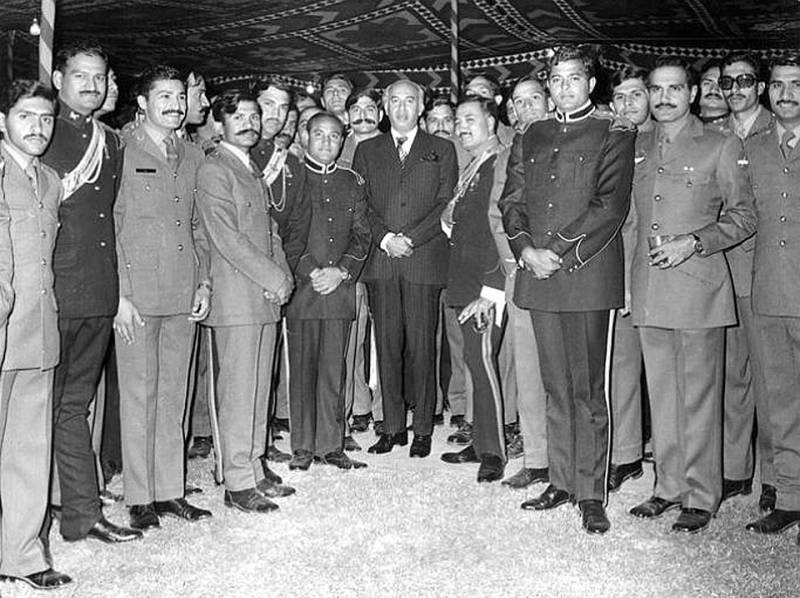
However, he had the opportunity the following year. By then he had been promoted three-star and replaced Gen Sharif as the corps commander in Multan. During a visit to Multan, the PM agreed to stay in the Guest Room in the Fort Colony. All the officers living in the colony were told to line the road that Bhutto passed on, along with their families. One young officer refused to have his family stand on the roadside to greet the PM, and he was posted to a far-off station in Balochistan. A year later Zia was appointed the army chief – bypassing seven lieutenant generals, some of whom would have been a far better choice to command the Pakistan Army.
However, Bhutto’s foremost consideration was loyalty to his person, and for this error of judgement, he paid with his life.

